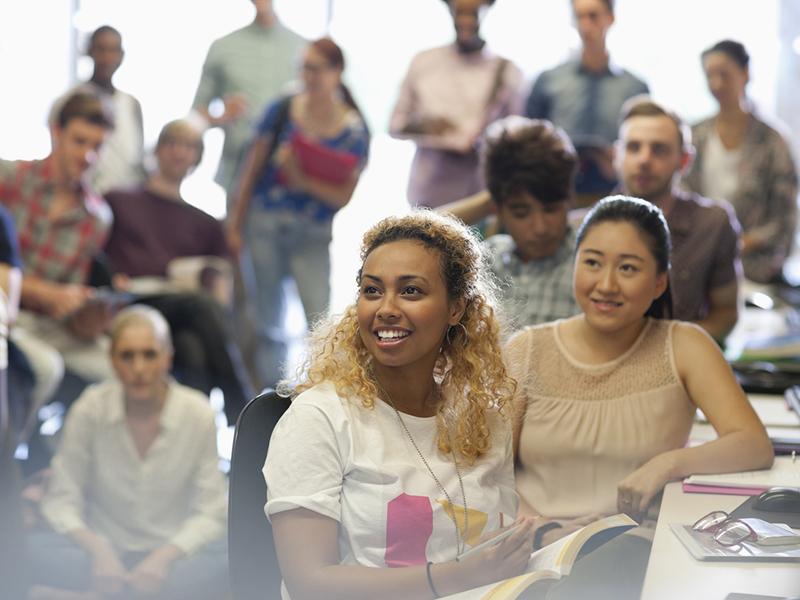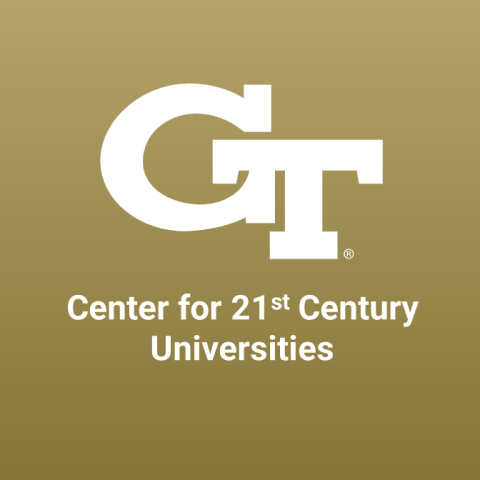
A whole-campus approach to boost belonging for student success
Student belonging in and out of the classroom correlates with improved resilience, persistence and academic success. However, social inequities, financial precarity, mental and emotional health challenges and pandemic-related stressors detract from students’ ability to feel included and engaged.
Holistic student success in higher education involves students, faculty and staff in a joint effort to build a cohesive community of learners. This year at Georgia Tech, we are embracing the challenge of promoting student belonging. A hallmark element of our approach is integrating the work accomplished through first-year and transfer student seminars with professional development for instructors explicitly around the topic of belonging. This includes a success workshop series, an asynchronous student success site, exploratory advising and peer mentoring. In this way, we use a professional learning community framework for instructors and synchronous and asynchronous resources to boost the sense of belonging among our student community.
Voluntary success seminars anchor belonging work
The success seminars are voluntary; annually, about 2,000 students enrol, with about 60 per cent of the first-year class and 20 per cent of transfer students participating. They are taught by a combination of credentialled faculty, staff and administrators, and peer facilitators/mentors act as team leaders.
- Undergraduate research to enrich teacher education
- Offer students a personal touch through peer support
- Build community into the curriculum to improve in-person attendance
The seminars have broad reach and support from across campus, both in providing instructors and resource offerings, so we chose them as a site from which to build out our belonging work. The first-year and transfer seminars focus on students’ understanding and amplifying their strengths; the seminars aim to cultivate study, time-management, leadership, communication and collaboration skills, and include opportunities to reflect on and plan for academic, co-curricular and career-readiness experiences. They provide organic opportunities for incorporating belonging into course elements and discussion, even if the term itself is not always invoked.
Smaller classes (generally 20 to 25 students) allow students to get to know each other well and consider their identities as college students, specific majors, future career holders and members of our community. Promoting “engagement in educationally purposeful activities”, according to research by the University of Illinois at Urbana-Champaign, has been directly correlated with an improved sense of belonging, persistence and academic success. Therefore, intentional reflection and active learning are key principles that should be part of first-year and transfer seminar course methodology.
Strengthening the professional learning community
This work is not just about students. Engaging in conversation about belongingness and its value better prepares instructors to meet students where they are, whether in times of success or challenge and to support them holistically as they navigate their way forward. Instructors also benefit from better pedagogical resources and professional development around the theme of belonging.
For us, this began with providing copies of Geoffrey Cohen’s 2022 book Belonging: The Science of Creating Connections and Bridging Divides at our annual instructor training conference. This year, instructors will be encouraged to participate in the Reading Circles programme. These small reading groups will explore and discuss the book and consider how the concepts might be applied in and out of the classroom. Through the reading groups and dedicated Teams sites, instructors will get to know colleagues from around campus, strengthening our seminars’ professional learning community.
A Belonging Bonus Challenge encourages instructors to generate and share a list of belonging-enhancing practices that we have tried or will try in our student-facing roles. Our work will be enhanced and supported further by Georgia Tech’s programming and online resources for inculcating inclusive pedagogy.
In-person and online workshops can provide additional student success support, through exploratory advising, peer mentoring and other resources. Creating belongingness for first-year students is not a one-size-fits-all effort; our team facilitates customised programmes and experiences across areas that connect our first-year students with the institute and each other. First-year students may choose from individual, group and asynchronous opportunities throughout their first semester. This creates a sense of ownership and inclusion, promotes internal motivation and advances a stronger, more personalised connection.
Timely workshops can impact student experience
Workshops that promote community and are centred around academic events (for example, when progress reports come out or withdrawal deadlines) can significantly impact a first-year student’s experience.
We have created “right time” delivery for presentations and workshops to complement the success seminars and as a supplement for those students not enrolled in a student success course. The presentations are offered on a day and time not reserved for classes to maximise availability. The series, which is curated for populations such as first-generation and transfer students, includes topics such as “What’s the hidden curriculum of the college experience?” and “Being first: centring your journey for college success”, as well as career-related areas like “The first-year guide to the GT Career Fair” and “Co-op and internships 101: the value of engaging in experiential learning”. Other topics align with the academic calendar.
Knowing that sometimes the best advice for navigating your first year comes from fellow students, we run an “Ask me anything” student-leadership panel at the beginning and the end of the semester. For first-year students who want to take a deeper dive into the metacognition of learning and developing better strategies for academic success, an asynchronous self-paced course is available in the institute’s learning management system.
The role of advisers, coaches and mentors
As an extra support layer, exploratory advisers, academic coaches and peer-to-peer mentorship programmes can help connect and reconnect first-year students to the university. Understanding that being uncertain or not progressing in a major can lead to stress and feelings of disconnectedness, exploratory advisers help students discover their passion and make informed decisions about their major. Opportunities to interact with advisers, faculty, upper-class students and professionals from different fields can offer support and guidance.
While exploratory advisers help students define their academic identity and connect with their academic home, academic coaches partner with students to implement individualised non-course-specific success strategies related to mindset, motivation and action plans.
With exploratory advising and academic coaching, students collaborate with professionals.
Peer-to-peer mentorship, on the other hand, provides social and academic connections for all students, but especially first-generation and transfer scholars – populations more likely to experience impostor syndrome. Peer mentors reinforce to these students that they deserve to be part of our community and will be successful here.
Aligning and connecting student success offerings can expand students’ access to campus opportunities, empower them to be agents of their educational success, and amplify their sense of belonging as not just valued members of our learning community but also welcomed contributors to it.
Lorett Swank is executive director of academic success and advising and Catherine Thomas is associate director of undergraduate transition seminars, both in the Office of Undergraduate Education at Georgia Tech.
If you would like advice and insight from academics and university staff delivered direct to your inbox each week, sign up for the Campus newsletter.
Additional Links
For more advice and insight on this topic, read our spotlight guide on how to build belonging at your institution.




